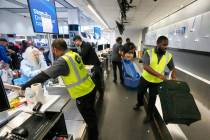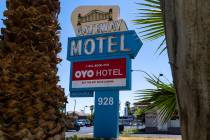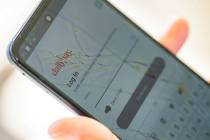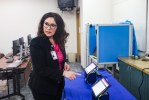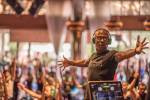Paralyzing accident can’t dull entrepreneur’s zest for business or life
Sure, your standard workday brings the typical corporate rush of meetings, conference calls, proposal presentations and a never-ending stream of e-mails.
But try handling all of those tasks paralyzed, from a hospital bed.
That's the reality facing Scott Frost, president of Titan Nightlife Group and founder of the Technology Business Alliance of Nevada. Frost suffered a spinal injury on May 10, when an accident threw him from the motorcycle he was riding.
Today, Frost spends several hours a day in physical therapy, working to regain mobility and keep his business running. Friends and family read him e-mails, take dictations and set up phone meetings as he continues to run his nightclub- and restaurant-branding and development business.
Frost, who returned home from the hospital July 27, doesn't just strive to close deals or improve function in his arms and legs. He also dedicates time to his new nonprofit, the Spinal Injury Rehabilitation Foundation, designed to inform spinal-injury sufferers of options for beginning rehab immediately. Meanwhile, Frost's associates are helping defray his medical bills: A "coming out" mixer is planned for Tuesday at Simon at Palms Place, and they've launched a Web site, www.healscottfrost.org.
Question: Talk about your accident. What happened?
Answer: My former spouse came to pick up our kids and take them to a movie, and I stayed behind to work on a proposal. I got a call from a good friend asking me to ride motorcycles. We went to Madeira Canyon, southeast of Anthem. We rode up into a flood-abatement channel, not doing anything dangerous. I putted up over the top of one bank and my wheel caught the edge. I went straight over my handlebars onto my head. I damaged my entire spinal cord in the cervical area. The injury was to the C3 and C4 vertebrae. I herniated a disk, tore ligaments in my neck and contused my spine. Doctors had to remove the disk between the C3 and C4 vertebrae and fuse my back, so I have a plate, screws, bone putty and plastic stents between the vertebrae.
I was wearing a helmet and I remember everything. I hit my head and it bent head backward with all my body weight. I knew immediately I was paralyzed, because even though I was flat on my stomach, I had a sensation of floating in warm water with my arms across my chest and my knees drawn up. I had difficulty breathing. The injury was high up enough that my diaphragm was affected.
Question: What was the first thing you thought?
Answer: I was so mad at myself. I could have been at a movie with my kids. My second reaction was concern that I had a broken neck, and they needed to move me quickly. But (because the area was outside town), it was 50 minutes before I got help. Meanwhile, I'm suffocating. When I realized I was in serious danger of dying, my anger turned to fear and sadness. I had my friend call my former spouse and my kids, and I said goodbye to my family.
Question: How paralyzed are you now?
Answer: After 10 weeks of seven-day-a-week therapy for three to four hours a day, I can move my arms and legs. I don't have a lot of function, but I can move everything. I can grasp things. I can sit up on my own once you sit me up, and if you brace me I can stand up, though you can't let go of me. I have started taking steps. With nine months to two years of intensive therapy, I could regain 90 to 100 percent of my functionality, which, given the severity of my injury, is nothing short of miraculous.
Question: How long was it before you could work?
Answer: The day of the accident, I called my partner from the hospital and told him not to stop anything we were doing. I'm alive, my head is fine, my mouth works. I have the best partners in the world. Their faith in me never wavered. We were smack in the middle of negotiating a lease with Mandalay Bay. Eleven days after I got to Desert Canyon Rehabilitation Center, I was on the phone wrapping up negotiations. I started holding regular conference calls with my team. Then we had to raise money for the project, so I was taking investor phone calls. Three weeks later, we closed the lease, and we just wrapped up financing. In the middle of all this, we were solicited for another proposal, this one for the Gila River Tribe. It would be a 6,000-square-foot nightclub at the Wildhorse Pass Resort (in Chandler, Ariz.). We gave a conference-call presentation to open and manage their nightclub. As I talked, my partners were there with them, answering questions and flipping through PowerPoint slides.
Question: What's a typical day like for you now?
Answer: Priority No. 1 is my recovery. Getting ready for the day -- something you can do in 30 minutes -- takes me an hour and 15 minutes. Then it's off to therapy for two hours. After that, I'll check e-mails, make phone calls, eat lunch and take a nap, because you'd be surprised how much energy you expend when you can't move, just trying to move. Then there's more therapy, and more phone calls, e-mails and meetings. I can review plans and have things printed out for me. Probably the biggest change is not being able to type out that quick e-mail or respond to that text.
Question: Why has it been important to you to stay active in your business?
Answer: First and foremost, I have a family to feed. Secondly, I have investors who have bet on our team. Third, the one thing I had left was my ability to think, communicate, plan and inspire. The first time I talked with Mandalay Bay to go over lease points, I got off phone and said, "I'm back in the game." It made me feel normal to be negotiating. It's the things that remind me I'm handicapped that are frustrating. Meetings, inspiring people, bringing a vision to life, organizing, planning -- that's the stuff that makes me feel normal.
Question: What do you hope for in the future?
Answer: My priorities have changed. Work used to be my No. 1 priority, and although work remains important to me, my God and my family have to come first. If I have a spare moment, I think, have I called my daughter today, have I talked to my son today, can I spend time with my girlfriend, or call mom and dad?
Question: What lessons can your situation offer to businesspeople?
Answer: No matter what obstacle is presented to you, there is a workaround other than throwing in the towel. I would also say people need to take a step back and make sure business doesn't consume them. There are very few things that are so crucial that they should come in front of a family and your relationship with God. I used to think, If I don't get that proposal done or get this money raised, the world will crumble. I'd think, I can't watch a movie with my kids right now because I have to take care of business. Entrepreneurs make a fatal mistake if they let business take over.
Contact reporter Jennifer Robison at jrobison@reviewjournal.com or 702-380-4512.
VITAL STATISTICS
Name: Scott Frost.
Position: PRESIDENT, TITAN NIGHTLIFE GROUP.
Family: EX-WIFE, HEATHER; DAUGHTER, TAYLOR; SON, CHRISTIAN; GIRLFRIEND, MEGAN POWELL.
Education: BACHELOR OF SCIENCE IN BUSINESS ADMINISTRATION FROM THE UNIVERSITY OF NEVADA.
Work history: PHARMACEUTICAL SALES REPRESENTATIVE FOR G.D. SEARLE; OWNER OF THUMPER'S DAY CARE, RENO; DIRECTOR OF SALES AT AMERICOMM, RENO; VICE PRESIDENT OF SMARTCITY NETWORKS, LAS VEGAS; GENERAL MANAGER, VEGASHOTSPOTS.COM; PRESIDENT, TITAN NIGHTLIFE.
Hobbies: MUSIC, DRUMMING, GOING TO CONCERTS WITH HIS KIDS, TEACHING ENTREPRENEURSHIP TO COLLEGE STUDENTS AT UNLV AND THROUGH NEVADA'S CENTER FOR ENTREPRENEURSHIP AND TECHNOLOGY.
Favorite book: "THE STAND" BY STEPHEN KING.
Hometown: RENO.
In Las Vegas since: 1998.
TITAN NIGHTLIFE GROUP IS AT 8860 W. SUNSET ROAD, SUITE 205, AND CAN BE REACHED AT 951-2001.


















